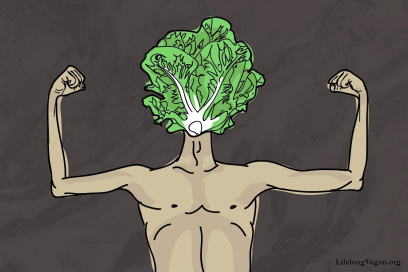Meat consumption has long been an integral part of human history and cultural traditions, serving as an ancestral reminder. But in light of global issues like environmental degradation, health concerns, and moral dilemmas that threaten humanity as a whole, the question of meat consumption has never been more pressing than now. Crucial to this discussion are inquiries such as these: Why shouldn't we eat meat? And are the arguments supporting this claim valid?
As a vegan expert, I have observed various reasons for why more and more people opt for plant-based diets in mainstream culture. A Worldwatch Institute study shows how factory farming directly contributes to climate change as nearly 51% of global greenhouse gas emissions come from animal agriculture; animal products also account for several health issues like heart disease, high cholesterol and obesity.
Animal welfare should also be an important factor when considering one's meat consumption. Factory farming has been accused of the cruel and inhumane treatment of animals, leading many to consider supporting this industry a violation of morals and ethics. Furthermore, deforestation, resource depletion and water insecurity are often unintended outcomes of animal agriculture industries that produce meat products for consumption.
As these pressing issues are so crucial to our future wellbeing, this article seeks to explore why meat should no longer be part of our daily lives and the numerous advantages associated with leading a plant-based lifestyle. Raising awareness on this subject and making conscious choices to create a more sustainable and healthier future are imperative. All stakeholders involved can agree on the advantages associated with leading such lifestyle. We must leave preconceptions due to misinformation behind us while accepting the reality behind science, facts and realities related to meat consumption.
I. The Environment and Physical Wellbeing Reasons
Veganism and plant-based diets have seen an increasing popularity over time for good reason; meat consumption can have detrimental effects on both our environment and physical wellbeing. Veganism prohibits all animal products such as meat, dairy products, eggs and leather whereas plant-based diets generally focus on whole and unrefined plant food with limited or no animal product consumption.
2023-05-10 21:42:54 +00000I have tweeted quotes from the Bible herein before, verses that state why we shouldn’t eat meat…but other religions traditionally have the same belief system such as Buddhist philosophy/Buddhism as well as Hinduism. I am not telling anyone what to eat, as that should be an… https://t.co/wm7c7l14Kv https://t.co/USwJ3b8uxc
What separates these two approaches?
While both may involve eliminating meat consumption, there are crucial differences that separate them. One significant benefit of adopting a plant-based diet for the environment is reducing land, water and energy resource output--which is significantly greater when producing meat than producing plant-based protein. A move away from meat towards plant-based protein could save thousands of gallons annually!
Adopting a plant-based lifestyle not only has environmental benefits, but can have tangible physical advantages too. According to research evidences, diets rich in antioxidant-rich fruits and vegetables have been found to decrease risks of heart disease, type 2 diabetes and some cancers; plant-based proteins contain lower levels of unhealthy saturated fats and cholesterol while being easily digestible - benefits which have drawn in athletes and fitness enthusiasts to embrace plant-based diets to perform at their optimal while protecting their wellbeing.
Staying away from animal products has the added advantage of expanding our culinary creativity. Experimentation with plant-based foods such as nuts, legumes, seeds, vegetables, fruits and whole grains can lead to delicious yet nutritional meals crafted by exploring various flavors and textures - perfect for creating satisfying yet appetizing dishes!
No matter our diet choices - be they vegan-focused or plant-based - the benefits of adding more plants into our diet are undeniable. Prioritizing whole, plant-based foods is proven to reduce carbon emissions, conserve water resources and energy usage and enhance physical wellbeing - making this approach attractive to many individuals.
II. Veganism and Plant-Based Diets
Meat consumption has long been associated with various adverse health complications, as evidenced by its link to heart disease, cancer and type 2 diabetes. Red meat in particular contains high amounts of saturated fat which wreaks havoc with cholesterol levels while increasing heart disease risk significantly. Carnivorous diets rich in saturated-fat-laden red and processed meats combined with inadequate dietary fibre intake propel people toward an elevated risk of colorectal cancer.
Plant-Based Proteins
Plant-based proteins with lower saturated fat content have proven a boon for population health, providing a golden avenue to combat chronic illnesses such as heart disease. Recent research published by the Journal of the American Heart Association in 2019 demonstrated lower life-span risk of heart disease among avid plant-based dieters, suggesting an optimistic conclusion when death comes knocking. Furthermore, plant-based diets were shown to significantly improve type 2 diabetes symptoms far outstripping meat consumption with ease.
Salads and Fruits
Praise is due for the plant-based food kingdom's celestial beings: fruit and vegetable progenies with unfathomably low caloric toll. Our approach towards fertility and satiety becomes easier by prioritizing whole plant-based foods over meat products for forestalling chronic illnesses, with some even offering salad recipes! Dietary fibre-rich diets ensure lasting satiation while simultaneously warding off chronic illness risks.
Weight Loss and Health Benefits
Paradoxically, plant-based diets are both delicious and slimming, adding the promise of weight loss to their reputation. A 2016 review study published in Journal of Academy of Nutrition and Dietetics demonstrated this phenomenon through lower body mass indices (BMIs) among those opting for vegetarian or vegan dietary regimes compared with nonvegetarian or meat eaters - likely attributable to low calorie and fiber rich components of plant-based diets that led to significant decreases in overall caloric intake - marking an impending start on this potentially skinnier journey!
Adopting a plant-based diet has many tangible advantages. From its high nutrient density and reduced calorie and saturated fat content, to weight reduction benefits such as curbing obesity. Indeed, plant-based diets may even stimulate weight reduction by providing filling foods at lower calorie counts that promote satiety - offering blissful green salvation! So why not choose blissful plant-based living as the path to fruitful health?
More on veganism and plant-based diets at PubMed.
III. Health Concerns
Animal Welfare and Meat Industry
Animal welfare advocates have long condemned the meat industry, and with good reason. Animals raised for meat production are often kept in cramped and subhuman conditions before being subjected to painful treatments such as castration, dehorning, and tail docking that not only cause extreme suffering but also pose serious infection risks and disease risk.
“Animals raised for meat production are often kept in cramped and subhuman conditions before being subjected to painful treatments.”
The Importance of Animal Welfare
As we hold the meat industry accountable for their questionable conduct, it is equally important that we recognize animal welfare. Animal welfare advocates recognize the significance of cruelty-free lifestyles - such as adopting a plant-based diet - as ways of avoiding animal cruelty altogether and decreasing demand for animal products by encouraging companies to employ more sustainable farming practices.
Plant-Based Alternatives to Meat
Thankfully, there are alternatives to meat available that can completely satisfy our dietary needs without harming animals. These plant-based alternatives include lentils, beans and peas as well as nuts seeds and tofu; all provide all essential amino acids required by our bodies. Some vegan burgers and sausages even attempt to recreate similar textures and tastes to real meat products while remaining cruelty-free!
- Lentils
- Beans and peas
- Nuts and seeds
- Tofu
The Impact of Diet Choices on Animal Welfare and Global Sustainability
Diet choices we make have an immediate and direct effect on animal welfare and global sustainability. Therefore, it's imperative that we advocate for ethical farming practices, as consumers we choose cruelty-free lifestyles, and advocate for ethical farming practices as advocates. With an ever-expanding selection of plant-based options available today we can show kindness towards animal welfare simply by choosing better diet options.
Conclusion
Meat consumption ethics must always include animal welfare as an integral component. Unfortunately, the meat industry has an unforgivable record of mistreatment and cruelty towards animals; to help alleviate such practices we should promote plant-based lifestyles while supporting more ethical industries if we wish to foster an inclusive world without cruelty or maltreatment.
IV. Animal Welfare
People tend to overlook the impact of meat production on climate change. According to the UN Food and Agriculture Organization, livestock accounts for 14% of global greenhouse gas emissions—more than any other industry sector including transportation.
Meat production and climate change
Meat production and climate change have an intricate relationship. Production of animal feed often causes mass deforestation, leading to the destruction of trees that absorb carbon and heightening carbon emissions. Furthermore, raising livestock requires significant land, energy and water resources that in turn contribute to greenhouse gases that exacerbate global warming.
But that isn’t all: animal waste disposal also contributes to our worsening climate crisis. Methane – an extremely potent greenhouse gas with 25 times higher emission rates than carbon dioxide – can be produced as part of animal waste, compounding its adverse effect on the environment even further.
Substituting plant-based diets with animal proteins for reduced greenhouse gas emissions
Opting for plant-based proteins requires less resources and releases only minimal greenhouse gases compared with their animal-based counterparts, providing us with an effective sustainable solution for mitigating climate crisis.
Plant-based meat alternatives provide direct climate mitigation while offering viable economic alternatives, by employing renewable energy, reducing animal waste streams, and needing far less infrastructure than conventional factories for producing meat products. Supporting these alternative industries represents key opportunities to build a more sustainable future while fighting back against climate change.
Conclusion
At its core, meat consumption is inextricably linked with climate change and its devastating environmental consequences. By adopting a plant-based lifestyle we can play our part in reducing carbon emissions and actively combatting climate change - every step counts! Let's all go green for our home planet.
“Animals don't have the capacity to change the way they produce food, but humans do. We can eat less meat, or we can eat meat raised using more sustainable methods.” Dr. Pete Smith, IPCC
References:
- The Guardian - This is the most important number in climate change
- BBC - Climate change food calculator: What's your diet's carbon footprint?
- National Geographic - Greenhouse Gases
Conclusion: Making a Difference with Plant-Based Protein
Environmentalism and health can go hand-in-hand, which is why meat consumption needs to be addressed as soon as possible. After exploring in detail its many environmental, ethical, and health implications, the question that arises is: "how can we make a difference?" One step could be replacing meat with plant-based protein sources or adopting an entirely plant-based diet; each small step has the power to change lives for better. While one person alone might not have the resources or time needed to make global change possible, their dedicated efforts can still make an impactful difference!
Introducing more plant-based foods into our diet can make a dramatic impactful statement about how committed we are to creating an equitable and sustainable future where life thrives without interference. By making healthful, sustainable and ethical alternatives to meat consumption a core part of our lifestyles we can take the first steps toward realizing this dream of a thriving life for all.
At this juncture, it is crucial that we recognize the power behind idea sharing and inspiring people towards sustainable practices. Through education of ourselves and those around us, we can actively champion cruelty-free, ethical living that also preserves environmental balance.
Adopting a plant-based lifestyle is undeniably a powerful force that can play an invaluable role in saving our planet, improving personal well-being, and shaping a more sustainable and vibrant future.




